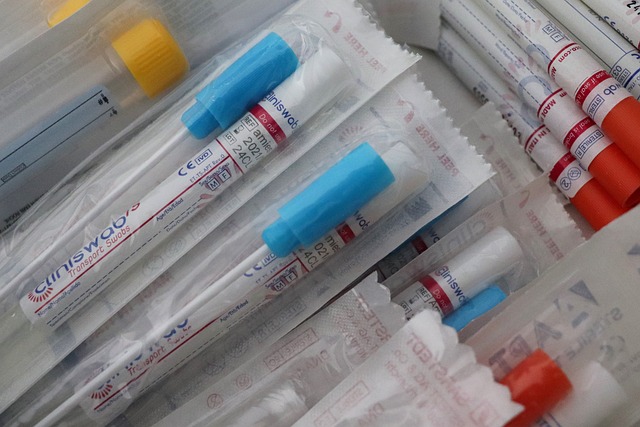Thyroid health, easily overlooked but significantly impacting overall well-being, is assessed using the UK Iron Blood Test, designed to measure TSH, T4, and T3. This test, along with others like the Serum Ferritin Test and TPOAB test, helps diagnose conditions like hypothyroidism and hyperthyroidism. Interpreting results is key; normal ferritin levels (12-150 mcg/L) indicate optimal function, while low levels suggest iron deficiency requiring dietary changes or supplements with regular monitoring.
In the UK, maintaining thyroid health is paramount as it influences overall well-being. Regular screening through a standard thyroid examination kit is crucial for early detection of thyroid issues, particularly in high-risk groups. This article delves into the importance of such kits, exploring their essential components, including the UK Iron Blood Test, and guiding readers on interpreting results. By understanding these steps, UK patients can proactively manage their thyroid health.
- Understanding Thyroid Health: Why UK Patients Need Regular Screening
- Components of a Standard Thyroid Examination Kit for UK Patients
- Interpreting Results and Next Steps After an Iron Blood Test
Understanding Thyroid Health: Why UK Patients Need Regular Screening
Thyroid health is often overlooked, yet it plays a pivotal role in overall well-being. The thyroid gland, located at the base of the neck, produces hormones that regulate metabolism, impacting everything from energy levels to heart rate and digestion. Disruptions in thyroid function can lead to various conditions, such as hypothyroidism or hyperthyroidism, affecting millions of UK patients annually.
Regular screening through a standard thyroid examination kit is essential for early detection and effective management. The UK Iron Blood Test, specifically designed for thyroid health assessment, measures the levels of thyroid-stimulating hormone (TSH), thyroxine (T4), and triiodothyronine (T3). This test enables healthcare professionals to identify potential issues and provide timely interventions, thereby improving treatment outcomes and quality of life for UK patients.
Components of a Standard Thyroid Examination Kit for UK Patients
A standard thyroid examination kit for UK patients typically includes a comprehensive range of tools and reagents to facilitate accurate diagnosis and management of thyroid disorders. Among the key components is the UK Iron Blood Test (also known as Serum Ferritin Test), which measures iron levels in the blood. This test is crucial as iron deficiency anaemia is commonly associated with hypothyroidism, where the thyroid gland doesn’t produce enough hormones. By including this test in the kit, healthcare professionals can quickly identify and address potential nutritional deficiencies.
Other essential elements of the kit may include test strips for measuring thyroxine (T4) and triiodothyronine (T3) levels, as well as a thyroid-stimulating hormone (TSH) assay. These tests help evaluate thyroid function and assess whether the gland is overactive (hyperthyroidism), underactive (hypothyroidism), or functioning normally. Additionally, some kits may offer a thyroperoxidase antibody (TPOAB) test to detect autoimmune thyroiditis, a common cause of both hyperthyroidism and hypothyroidism.
Interpreting Results and Next Steps After an Iron Blood Test
After undergoing a UK Iron Blood Test, interpreting the results is an essential step in understanding your thyroid health. The test measures ferritin levels, which indicate the amount of stored iron in your body. Normal ferritin levels typically range between 12-150 micrograms per litre (mcg/L). If your results fall within this range, it suggests that your iron levels are adequate and your thyroid function is likely optimal. However, if your ferritin levels are below the normal range, it may indicate iron deficiency, which could be a result of various factors including blood loss, poor diet, or increased iron requirements during certain life stages or medical conditions.
If your UK Iron Blood Test reveals low ferritin levels, the next steps involve further investigation and potential treatment. Your healthcare provider may recommend additional tests to identify the underlying cause of iron deficiency. This could include a full blood count (FBC) to check for anaemia or other red blood cell abnormalities. Based on these results, they might suggest dietary changes, such as increasing iron-rich foods in your diet or consider prescribing oral iron supplements to help raise your ferritin levels. Regular monitoring of your ferritin levels during treatment is crucial to ensure effective management and restoration of optimal thyroid function.
A standard thyroid examination kit, including a UK Iron Blood Test, is an essential tool for maintaining optimal thyroid health in UK patients. By regularly screening for thyroid disorders, individuals can ensure early detection and prompt treatment, preventing long-term complications. Understanding the key components of this kit and interpreting test results empowers patients to take charge of their health and make informed decisions regarding their well-being.
